- Homepage
- Our green kitchen
- Compost Bins Gardening
Compost bins gardening
Compost bins gardening is about when to start, what to use and where to put all the output from your kitchen-trash. It's not about the cans, bottles and plastic that just go to the recycling.
In just a few months you can turn this waste into beautiful rich soil instead of sending it to the dump where it creates problems for the local-authority, the rats will gorge on it and it generates yet more greenhouse gases.
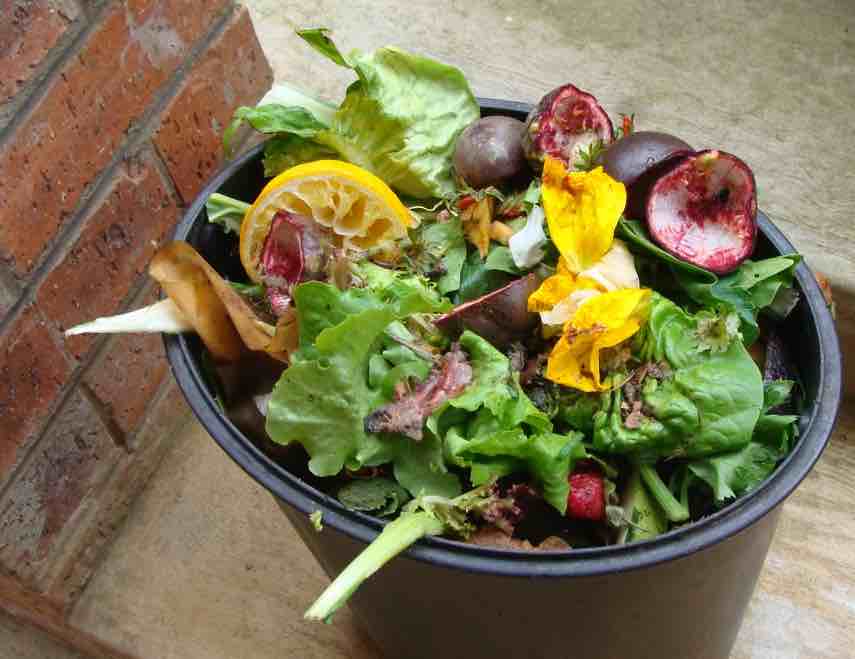
This page was last updated by Bernard Preston on 7th February, 2025.
It is not about building compost-bins in the garden; frankly I don't believe in them though they do have their uses in the small backyard. They simply do not make enough humus and unless they are quite sophisticated you are likely to break your back getting the friable material loaded and the "black gold" out.
This is all about your kitchen trashcan.
Firstly it definitely needs a little pedal so you can open it without using your hands; they will be busy scraping the waste off the chopping board with a knife.
If you have to bend over repeatedly to lift the lid then you're likely to put your back out, so spend the extra or it will be costing you ten-times as much at the DC. The lumbar spine and sacroiliac joints do not like bending and twisting.
Secondly it must have a plastic-inner; frankly the compost bin for kitchen-waste that is on its way to the garden is a pretty disgusting thing. A mixture of tea leaves, egg shells and slimy lettuce is exactly what the pile, or your worm farm will love but it gets smelly and unpleasant quite quickly. Empty it at least twice a week; and scrub it clean regularly.
Interestingly the contents of your compost trashcan and how often you need to empty it, gives a good measure of the wellness of your family. There is strong research showing that those folk who enjoy eight or more coloured foods every day have a 35% lower all-cause of death; that's massive.
All the fruit-peelings means
plenty of vitamin C from your food, so there'll be fewer visits to the
doctor for flu; and you can avoid the very questionable jabs that are
recommended every winter.
The material expressed on this page is gleaned from the nutritional and environmental literature; it is clearly referenced. A plain distinction is made between the author's opinion and that which is scientifically proven. When in doubt consult your health professional.
To suggest a correction or clarification, write to Dr Bernard Preston here. Contact.
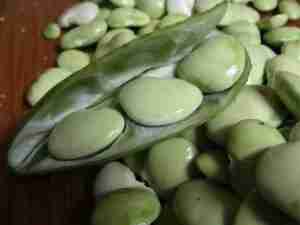 Bean pods to the compost bin
Bean pods to the compost binIf your compost bins for gardening are filled to overflowing with pumpkin peels, onion skins and green bean pods then you can be sure that you and your family are getting plenty of those coloured foods that our bodies so desperately need; and gem-squash shells and salads that have passed their best too,
This is where the vitamins, minerals and phytochemicals are to be found; the roughage for a happy colon too. I am not a vegetarian but those who loudly proclaim the carnivore eating-plans miss out on these seriously important substances that help us wade off malignant tumours; sulforaphane, quercetin and hundreds, perhaps thousands of others.
What are phytochemicals, you may be asking? They are simply a vast array of substances in plants that act in our bodies to protect us against malignant disease, inflammation and sickness. Forty of them have now be shown to be vital for our wellness; without lutein for example you are likely to get macular degeneration or a cataract.
If you are seriously concerned about greater well-being then it is time to find out about substances like the lignans in wheat, choline in eggs and your greens; betaine in beets and the lycopene in tomatoes too. Don't fuss too much about their names and what they do, but do make sure you are enjoying a wide variety of whole foods.
And then your compost bins will be overflowing with gardening material for the humus that plants need to give you nutritious fruit and vegetables.
Compost bins gardening
Compost bins gardening covers the whole spectrum from the kitchen to the pile.
If the contents of your compost bins are going straight to the garden pile, then avoid cooked food; vermin like rats will be likely to make a meal of it and they rot rather than break down to lovely-smelling humus.
Once cooked they lack the bacteria and fungi that will break them down. It's for this reason that we stopped eating boiled eggs; the shells are useless in a compost heap.
How to start a compost heap is central to our green home.
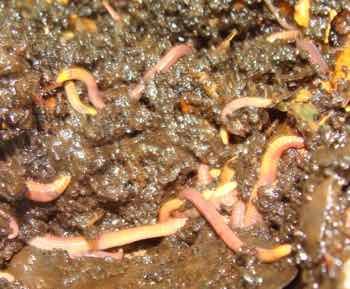 The wonder of worm-farms
The wonder of worm-farmsIf your compost bins gardening first are destined for the worm-farm, which is my recommendation then you can be less fussy; they will devour almost anything, cooked or otherwise.
Actually that's not entirely true; they do not like the dough for a pizza base, for example, or what South Africans call putu. It's a corn-crumble made from refined maizemeal.
We should keep them for high and holy days in any case; it's refined carbohydrates like these that make us obese, and ultimately diabetic.
They have none of the resistant starch that evades digestion in the small intestine and feeds the very important normal flora in the colon.
Worm-farms are also not fond of the acidic fruits so citrus, pineapples and tomatoes should perhaps go straight to the compost pile; but I don't fuss too much.
The benefits of worm farms are vast; firstly they will consume all the waste in your compost bins in a short time, depending on how finely it is chopped. Whole potatoes take longer, for example; cut them in half.
Secondly the vermi-tea that is produced is an organic liquid manure that is enormously beneficial to your plants but do either dilute it; or water it in thoroughly, otherwise it will burn sensitive young roots.
The vermi-compost is the perfect medium for all your seedlings; rooting is far more prolific. It's the perfect natural food for getting your garden soil ready for spring. And it all is utterly dependent on being fed from your kitchen compost bins.
And then we use the worms for chicken food.
It's all about making use of a cycle of nature that we call backyard permaculture; working with nature rather than against it.
Your compost heaps in late winter are much easier to open and barrow around the garden. It is the right time to extract the black gold, when the humus is light and dry; in a summer-rainfall region.
Holy potatoes grown in alter-flower compost; unusual opportunities may crop up periodically.
Newsletter
Our newsletter is entitled "create a cyan zone" at your home, preserving both yourself and Mother Earth for future generations; and the family too, of course. We promise not to spam you with daily emails promoting various products. You may get an occasional nudge to buy one of my books.
Here are the back issues.
- Lifestyle and ideal body weight
- What are ultra-processed foods?
- Investing in long-term health
- Diseases from plastic exposure
- Intensive lifestyle management for obesity has limited value
- A world largely devoid of Parkinson's Disease
- The impact of friendly bacteria in the tum on the prevention of cancer
- There's a hole in the bucket
- Everyone is talking about weight loss drugs
- Pull the sweet tooth
- If you suffer from heartburn plant a susu
- Refined maize meal and stunting
- Should agriculture and industry get priority for water and electricity?
- Nature is calling
- Mill your own flour
- Bake your own sourdough bread
- Microplastics from our water
- Alternative types of water storage
- Wear your clothes out
- Comfort foods
- Create a bee-friendly environment
- Go to bed slightly hungry
- Keep bees
- Blue zone folk are religious
- Reduce plastic waste
- Family is important
- What can go in compost?
- Grow broad beans for longevity
- Harvest and store sunshine
- Blue zone exercise
- Harvest and store your rainwater
- Create a cyan zone at your home
Banana-peels
I find that bananas do not do well in the worm-farms; they just go rotten and slushy. The Grow Network recommends you bury one or just its peel in the soil close to roses for extra potassium. Give it a try.
- Making a compost pile is important in the organic garden. Or in spring just plant a few butternut seeds right in the heap.
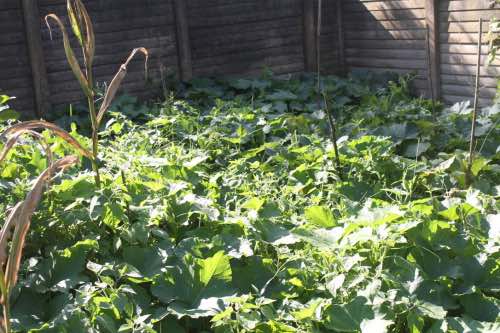 Butternut surging forth from a compost pile
Butternut surging forth from a compost pileThis is what the contents of your compost bins gardening will be turned into; barrow-loads of winter squash as they are called in North America.
We too need potassium by the way by the barrow-load; then you don't need to fuss so much about the sodium in your salt.
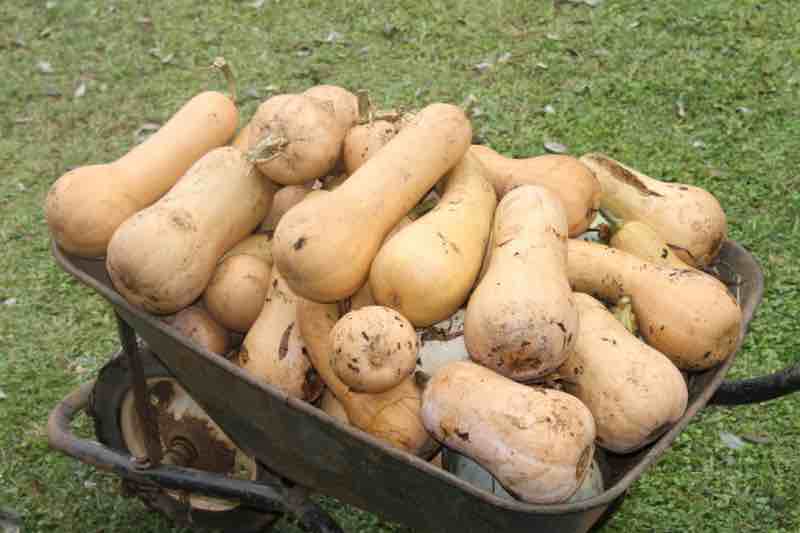
When browsing use right click and "Open Link in New Tab" or you may get a bad gateway signal.
Contrary to what we may think, compost does not stink. It is no contradiction for you to go forest bathing in an area near to where your next wheelbarrow of humus will be coming.
If you read just one book a month, you will probably fall short of a thousand in your whole life, and most likely nearer 500. Enjoying a good yarn is like having a private conversation with the author.
If you are enjoying Bernard-Preston.com, then perhaps I can invite you to a journey through the polders of Holland with me. That is how you can support this site, and enrich your own life with some easy bedside reading and stepping up to greater well-being.
My books are available from Amazon on Kindle.
Did you find this page interesting? How about forwarding it to a friendly book or food junkie? Better still, a social media tick would help.
- Homepage
- Our green kitchen
- Compost Bins Gardening
Address:
56 Groenekloof Rd,
Hilton, KZN
South Africa
Website:
https://www.bernard-preston.com